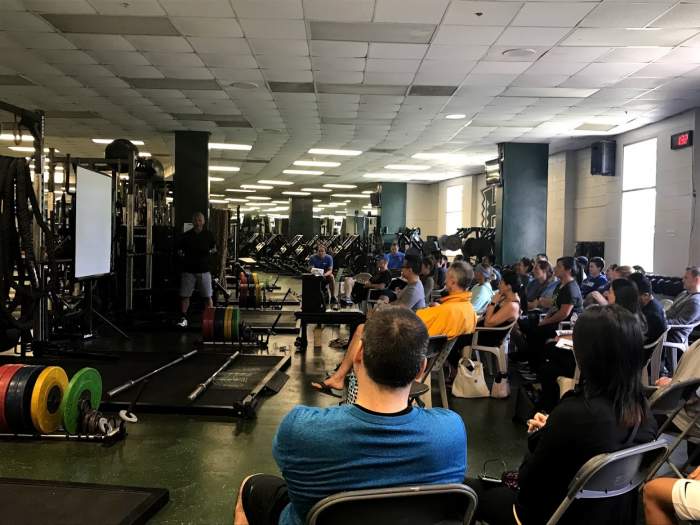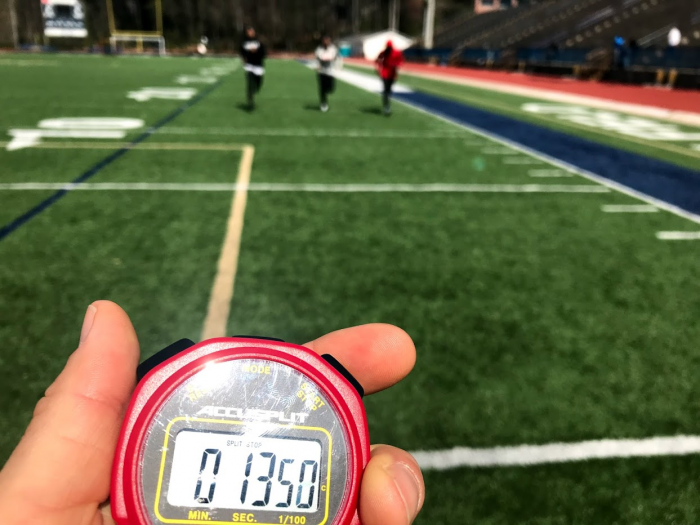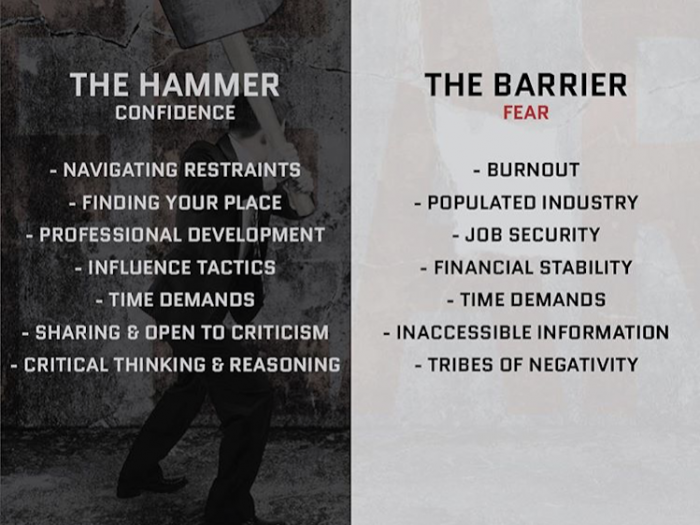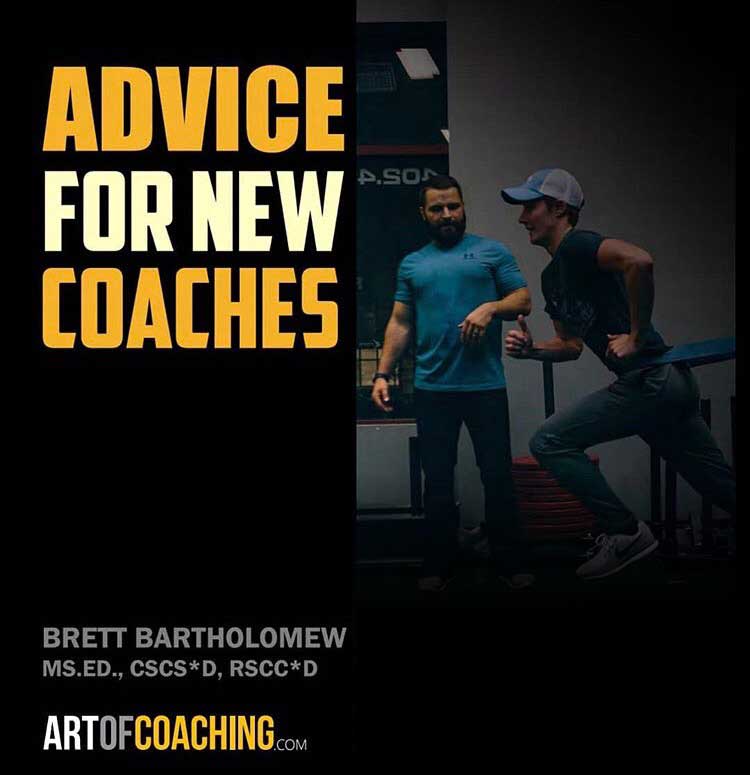Some version of the cycle occurs every day. There are coaches being fired, coaches switching jobs, coaches looking for jobs, coaches having to take massive pay-cuts and other coaches who have decided either to strike out on their own, or even quit being a strength coach altogether due to the vocational drought that has plagued our field for far too long. What’s perhaps even more alarming? The cycle is progressing at a far faster pace than we as a community are with actionable solutions, which is a problem since coaches have bills to pay and families to feed just like any other professional.
Sure it may rain dopamine every game-day for all of us when we can be there to support our athletes during competition, but once we go home it feels at times as if the well has run dry once we realize we’ve been “stuck” in the same role with the same level of pay for years, despite having more and more responsibilities placed upon us.
Then again, we march around so much saying that “we don’t do it for the money” and that we are the hardest working people in the room so can we really blame those who end up taking us at our word?
I digress.
What is clear is that both the climate and the landscape of strength and conditioning is changing, and will continue to do so rapidly over the next 20+ years.
Never before has it been harder for a strength and conditioning coach to find a sustainable job- this holds true regardless of age, degrees/certifications held, and even the amount of “years in the trenches” one has to their name. When you stop to think about it, isn’t it a bit ironic that while we often seem to create divides amongst the various sectors in the profession, that it is unemployment of all things that unifies us due to the widespread nature of the scarce resources and opportunities that exist in the field?
Perhaps it’s time we do something about that. Even if it involves starting at ground zero and taking baby steps by applying concepts of progressive overload to the management of our careers in the same way that we apply it within our training programs.
As much as many of us would like for it to be the case, no governing body or entity is going to save us. The solution is going to have to come from within and it is going to require a combination of ethics, strategy and unity especially if we hope to dig ourselves out of this hole anytime in the near future. Collectively, we are a community that while strong willed- is still far more adversarial with one another than we are advocates for one another. For us to advance, this will have to change as well. As it stands, we tend to only like to see those who are like us, that don’t threaten us, or who agree with us to succeed. And Heaven forbid if there is someone who has crossed over, created a unique avenue for themselves, or been awarded a higher-level management position within a team since we often react to those who exist in these categories by eventually rooting against them because they are now a guru or “big time.”
Time to wake up! Good, bad or indifferent, all of us as strength coaches are lumped together in the same category by those outside of our circle (media, administration, other professions etc.) and it is is their perception of us that in part dictates our reality.
In short, it is time to upgrade both our ethics and our image as a profession. And over the next year, my aim is to provide talking points and possible strategies as to how we can do so one topic at a time. And since I’m writing this article as I sit on a plane after attending/speaking at a conference this weekend, the first topic of relevance we are going to look at is networking.
I’ll be honest, I dislike this term just as much as any of you due to the stereotypical connotations that are associated with it. But as I stated in my book, we cannot get hung up on terminology and let our emotions dictate our thoughts and actions. Call it what you want, but the point is that people have approached this side of things the wrong way for far too long. It is especially relevant because all of us- regardless of age, status, job title or experience level- will call upon members of our network at some point in time for help.
That is the purpose of a network, to help one another and bolster the chances of success of the collective for a common good. When done correctly a network becomes a community. A two-way street, NOT a transaction. So how can we rip up the “old road” and pave a new path? Let’s start with the 11 tips mentioned below.

Be a Connector: Proper networking is about finding ways in which you can add value to the lives and careers of others. Ask yourself what problems can you help someone solve? Who can you introduce them to that they may enjoy/benefit from their perspective? How can you make some part of their path easier? These are the questions you should lead with both internally and externally as opposed to “how can I get noticed?” Networking done well is not about you.
Be Inclusive: Go to a clinic and many times you will see young coaches swarm around those who work only in pro-sport or at large institutions while a number of other lesser known coaches, or those speaking on topics without sexy titles get passed by or ignored altogether. This is a terrible mistake not only on the part of the young professional, but any coach in general. Often times, people only try to build relationships with those who they admire, look up to, have heard about, or believe can help them. Again, networking is not about you and your desire for recognition or validation, it is about you being able to establish authentic connections that allow you or others to help more people down the road. It is about bridging a gap and finding ways to create positive change for as many coaches as possible regardless of what setting or sector they work in.
In short, do not just try to connect with those you perceive to be “above” you, or those who have received numerous accolades. I’ve said it before, some of the best strength coaches out there are those you have never heard of and often coach in the most meager of settings. Title and status do not always equate to wisdom or value.
You should never be above learning from everyone, regardless of how long they have been in the field or who they work for. Be sure to make it a point to connect with those just starting out and those going through similar struggles that you may have had at some point. Not only do you never know who these people may grow into becoming or their future impact on the field, but you may even be able to help them get there while learning a few things yourself!
Be Selective: This piece of advice may seem to be at odds with the previous tip, but the anthem of this axiom is actually one of realizing that when trying to provide true value to others, it is best to focus on helping 5 people at once instead of 50. Networking is NOT about how many people you know, but rather how many people you are actually able to help. It is often the most well-meaning who try to bite off more than they can chew, but would be well-served to remember that the more thin you spread yourself, the less meaningful assistance you will be able to provide to others.
Be Inquisitive: This is a simple one. When seeking wisdom and trying to make a difference it pays to be curious. The best way to get to know someone is to ask them thoughtful, open-ended questions and then shut-up and actually listen to their responses. No matter what great thing you feel like you have to say, there are moments in time where a rejoinder is not always unwelcome but also unnecessary. If you are going to be able to provide people with value, then you need to both understand and care about what they are saying more than you care about your own response. This harkens back to an old Dale Carnegie principle which states, “to be interesting, you must first be interested.” This is not only one of the most important points made in this article but one that is worth putting into practice in every part of your life.
Be Supportive: When building relationships it is not only critical that you do your research on the individual beforehand, but also that you follow-up and continue to check-in on the work and progress of those you connect with. Take an interest in their growth, and pay attention to the issues they themselves seem dedicated to solving. After speaking with them or meeting with them for the first time, be sure to let them know that you appreciated their time and specific talents. Conveying interest and appreciation goes hand in hand with being inquisitive and paying attention. Most of all, when giving thanks, don’t be ingratiating. Be sincere.
Change the Venue: While conferences and clinics are great for touching base with a wide variety of coaches from all over the world, the best conversations and real-learning often happen in informal settings such as over dinner, drinks or even during a training session. Due to issues with my liver which occurred during birth, and while I was hospitalized, I rarely drink. But whenever I am traveling out of town to speak at/attend a clinic, I do try and always make it a point to always join when others who are going to “have a beer” or go grab a bite once the day has finished. Like it or not this is when many people let their guard down. Additionally, since most coaches are often skeptical or curious about other coaches they have heard about or haven’t met, it’s also good for others to see you conversing and interacting with peers so they can get an honest feel for how you carry yourself and treat others in the field. So regardless of what your “morning routine” entails, give it up every now and then to spend a late night with some good people and be sure to keep your ears open and maybe even smile once in awhile. The recrudescence of your “strength coach scowl” can come on Monday morning before your next group.

Be Mindful of The Company You Keep: You can do all of the other things in this article correctly and still find yourself having trouble connecting with others based on one specific thing most people overlook- those they surround themselves with, or choose to align with. Your reputation is not just a manifestation of your actions and the perceptions of others, but also of the reputations and behaviors of those in your “inner-circle.” Negative associations can happen in two predominant ways here: the first, centers around you hanging around those who seem to fly ethical red flags wherever they go, either for the sake of seeking attention, stirring up controversy or having poor self-awareness in general.
The second comes from being involved with those who can never seem to get out of their own way and are so miserable that they tend to drag everyone else around with them. These are the types who are never happy with the job they have, where they live, what they are doing etc. While it may seem like a great idea to help these people by any means necessary- you must learn to discern between someone going through a rough time, and a perpetually parasitic partnership where the individual only plays the innocent victim card. As author Robert Greene states, “emotional states are as infectious as diseases.” And they won’t just spread to you, but to your budding network as well.
Be Who You Say You Are: Many times I have come across coaches who are respectful and well-spoken in one setting, yet act abrasive and supremely unprofessional in another setting once they are no longer around people they are trying to connect with, or impress. I’m not talking about the difference between your demeanor at work and when you are off-the-clock celebrating with close friends- I’m referring to “flip-floppers.” A flip-flopper is essentially the same as someone who is two-faced in some regard and often takes pleasure in trying to play both sides and multiple angles at once. This may be someone who is openly respectful and supportive of you, or someone else’s work in one setting (in-person), yet bad mouths these same individuals in another setting (over the internet or while with another group of people). Flip-floppers often think they are being slick by trying to leverage multiple avenues of influence by gaining favor of multiple groups through multiple channels, but eventually they are easy to spot either due to the inconsistency of their behavior, or their inability to mask it for long. I’ll never forget the awkward feeling I had while sitting at a restaurant with a group of fellow strength coaches after a conference listening to a coach, who had just moments before, told a presenter that they had done a great job after their talk, proceed to tell everyone at the table how much of an “pretender” they thought the last speaker was.
Mind you that this individual had just wandered in the restaurant and asked to join our table which we happily welcomed him to, and barely knew anyone in the group except for two people who he later admitted to being his “idols.” The crux of the situation was that he knew that these two individuals were not a fan of the training methods discussed by the previous speaker. So despite him communicating his appreciation to the speaker just minutes before, he had now flipped in order to gain acceptance and the favor of those at the table. This is NOT networking, this is called being insecure. And while it may have flown in the cliquish “old days of S&C” it is a practice that has no place in it’s future if we hope to defend and bolster the integrity of the field.
Respect Everyone’s Time: Nobody’s time is free, and it is the only resource that none of us get back. Even when someone does agree to meet you for coffee, allow you to come shadow, or chat with you on the phone, be sure to lead by letting them know that their time is valuable and that you appreciate them taking a moment out of their day. Then, get right to the point. Exchanging a bit of initial small talk and pleasantries is fine, and is even the norm in many parts of the world- but you also need to remain cognizant that the person you are speaking to likely has a family, a job to do, an inbox filled with “urgent” messages, and countless other individuals competing for their attention. Even if they assure you they have plenty of time and are in no-rush, you should not take that as an invitation to put your feet up and start a 10 minute monologue. Remember, your first goal should be to ask how you can help them in any way not to see how much information you can divulge yourself or extract out of them.

Remove Distractions: The most memorable conversationalists I have been blessed to speak with displayed an uncanny ability to keep their attention on me, or on the topic at hand at all costs. One, in particular, I will never forget. I was no more than 27 years old, was nowhere near “their level,” and yet anytime I walked by their door they would welcome me in, turn off their computer, leave their cell-phone at their desk and lock into the conversation. The conversations were always 15 minutes or less, but they were also some of the most indelible I’ve ever had.
Master Timeless Touches: Famed Russian military leader Alexander Suvorov once stated, “fight the enemy with the weapon he lacks.” While it’s easy to initially glance over this quote as a cliche military mantra, the fact is that it speaks to the importance of being observant, mindful and resourceful by doing the things that most others forget to do, or have little to no awareness of. The fact is that most people hope to stand out, yet routinely take other people’s time and generosity for granted. You can, and should separate yourself by doing simple things like writing anyone who helps you a hand-written note, sending a small “thank you” gift, or even by supporting a future endeavor, project or product of theirs. I once heard a coach say he wanted to send a strength coach who had written him a kind letter of recommendation something but didn’t have enough money or know what to give him. When building relationships it is critical that you reframe certain expenses as investments. Even picking up the tab for a $5 cup of coffee says a lot more than you would think.

Bridging the Gap- Together
The points made above are just one small piece of the puzzle of how we can revamp the way some common things are both viewed and done from a career management standpoint in S&C. Addressing the concept of networking of all things may not seem like a critical step, but the reality is that we need to start managing our professional decorum with the same attention to detail that we manage our athlete’s programming if we hope to be taken more seriously as professionals and as a profession as a whole.
It is important that future generations of coaches learn that proper networking is NOT about finding ways as to how you can get an “in” with someone, but rather how you can help them. Knowing how to do it well is a matter of realizing that many of us all want the same things even if we take different paths to get there. Those “things” include helping our athletes succeed, providing for our families, and finding new ways to improve as professionals.
Accomplishing all of this will require people who are less concerned with recognition and more concerned with building a renewed and visible sense of shared purpose throughout the strength and conditioning community.
An understanding that nobody in our field rises or falls alone.
*This article discusses just one of the many lessons I’ve learned over the course of my career thus far- if you would like to check out more you can see them here.
Originally published at simplifaster.com on May 3, 2018.



